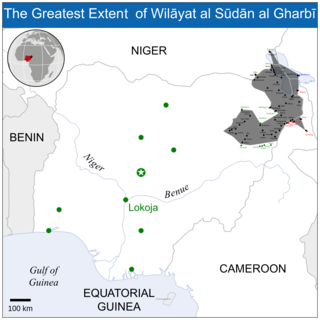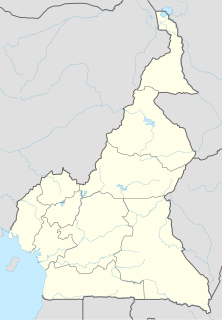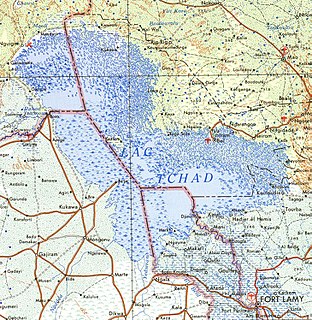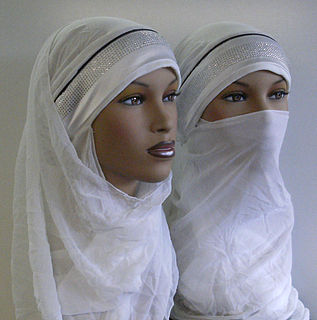
A niqāb or niqaab, also called a ruband, is a garment that covers the face, worn by many Muslim women as a part of an interpretation of hijab. The terms niqab and burqa are often confused; a niqab covers the face while leaving the eyes uncovered, while a burqa covers the entire body from the top of the head to the ground, with only a mesh screen allowing the wearer to see in front of her. According to the majority of Muslim scholars and Islamic schools of thought, face veiling is not a requirement of Islam. Those Muslim women who wear the niqab, do so in places where they may encounter non-mahram (un-related) men.

Boko Haram, officially known as Jamā'at Ahl as-Sunnah lid-Da'wah wa'l-Jihād, is a terrorist organization based in northeastern Nigeria, which is also active in Chad, Niger and northern Cameroon. In 2016, the group split, resulting in the emergence of a hostile faction known as the Islamic State's West Africa Province.

Gwoza is a local government area of Borno State, Nigeria. Its headquarters are in the town of Gwoza, a border town "about 135 kilometres South-East of Maiduguri." The postal code of the area is 610.
Fotokol is a town and commune in Logone-et-Chari Department, Far North Region, Cameroon. It is home to Fotokol High School.

The Boko Haram insurgency began in July 2009, when the militant Islamist and jihadist rebel group Boko Haram started an armed rebellion against the government of Nigeria. The conflict takes place within the context of long-standing issues of religious violence between Nigeria's Muslim and Christian communities, and the insurgents' ultimate aim is to establish an Islamic state in the region.
Timeline of the Boko Haram insurgency is the chronology of the Boko Haram insurgency, an ongoing armed conflict between Nigerian Islamist group Boko Haram and the Nigerian government. Boko Haram have carried out many attacks against the military, police and civilians since 2009, mostly in Nigeria. The low-intensity conflict is centred on Borno State. It peaked in the mid 2010s, when Boko Haram extended their insurgency into Cameroon, Chad and Niger.
Gamboru is a market town in Borno State, northeast Nigeria, near the Cameroon border. It is the administrative centre of Ngala local government area.

On the evening of 1 June 2014, an improvised explosive device was set off at a football field in Mubi, Adamawa State, Nigeria. At least 40 people were killed in the attack, according to eyewitnesses. Nineteen others were injured. The perpetrators of the attack were not clear, although media reports generally blamed Boko Haram.
The following lists events from 2014 in Nigeria.

The 2014 Kano bombing was a terrorist attack on November 28, 2014, at the Central Mosque in Kano, the biggest city in the mainly Muslim Northern Nigeria during the Islamist insurgency in Nigeria. The mosque is next to the palace of the Emir of Kano, Muhammad Sanusi II, Nigeria's second most senior Muslim cleric, who had urged the civilians to protect themselves by arming up against Boko Haram. Two suicide bombers blew themselves up and gunmen opened fire on those who were trying to escape. Around 120 people were killed and another 260 injured.
The following lists events that happened during 2015 in Chad.

Starting in late January 2015, a coalition of West African troops launched an offensive against the Boko Haram insurgents in Nigeria.
On three days immediately before and during Ramadan, 2015, four attacks struck Chad's capital N'Djamena. Three suicide attacks against two police targets killed 33 people on 15 June, five policemen and six terrorists were killed during a police raid on 27 Jun, and a suicide bomber killed 15 in N'Djamena's main market, on 11 July.

The 2015 Chad suicide bombings were a suicide attack which occurred the afternoon of Saturday 10, October 2015 in the town of Baga Sola, Chad, a small fishing community on Lake Chad. The attack was allegedly perpetrated by the Nigeria-based Islamic extremist group Boko Haram and resulted in the deaths of around 36 individuals, and wounded upwards of 50 more. The attacks were reportedly carried out by two women, two children, and a man with the intended targets being a busy marketplace, and a nearby refugee camp hosting tens of thousands of Nigerians. It was the deadliest attack to take place in the Lake Chad region.
This article contains a timeline of events from January 2015 to December 2015 related to the Islamic State of Iraq and the Levant (ISIL/ISIS). This article contains information about events committed by or on behalf of the Islamic State, as well as events performed by groups who oppose them.
The Battle of Kodunga was a military engagement between the Nigerian Armed Forces and Boko Haram insurgents in Konduga, Borno State, northeastern Nigeria, in September 2014.

Bodo is a village in the Far North Region of Cameroon, adjacent to the border with Nigeria.

The Chad Basin campaign of 2018–2020 was a series of battles and offensives in the southern Chad Basin, particularly northeastern Nigeria, which took place amid the ongoing Boko Haram insurgency. The Chad Basin witnessed an upsurge of insurgent activity from early November 2018, as rebels belonging to the Islamic State's West Africa Province (ISWAP) and Boko Haram launched offensives and several raids to regain military strength and seize territory in a renewed attempt to establish an Islamic state in the region. These attacks, especially those by ISWAP, met with considerable success and resulted in the displacement of hundreds of thousands of civilians. The member states of the Multinational Joint Task Force (MJTF), namely Nigeria, Niger, Chad, and Cameroon responded to the increased insurgent activity with counter-offensives. These operations repulsed the rebels in many areas, but failed to fully contain the insurgency.
At about 10am on 25 January 2016, a quadruple suicide bombing occurred in Bodo, Far North Region, Cameroon. It killed over 30 people and injured about 65 others. Two bombers struck the village's market; the others struck the entry and exit points.

The burqa is worn by women in various countries. Some countries have banned it in government offices, schools, or in public places and streets.










